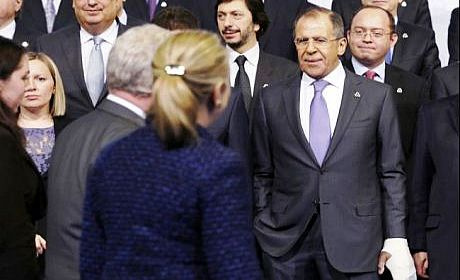US and Russia Do Not Have the Last Say

Russia has, this time, dispatched an infantry along with its warship to Tartus port. What does the dispatch of this infantry to the port mean?
Russia makes regular military visits to Tartus. The difference is that this time an infantry is accompanying the warship. The presence of the infantry differentiates this move from Russia’s previous military measures. But this does not mean that Russia has decided to enter Syria. The only thing that can be said in this regard is that Russia intends to take a precautionary measure, for Russia has no intention of militarily intervening in Syria. This has been Russia's strategy with regard to Syria. Russia opposes any military action against Syria and it is on this basis that it vetoes any resolution proposed in this regard. Russia has, hitherto, vetoed two Security Council resolutions which could have been used to attack Syria. Therefore, considering these issues, it does not seem that Russia would intend to pursue military action in Syria, thus, giving no excuse to the western countries to militarily engage themselves in this country.
Is there not a possibility that the Russians have taken this measure based on their information to prevent a military intervention by the western countries?
The fact is that even if such an incident occurs (which seems impossible at the present time), the Russians do not have the provisions to engage themselves militarily in Syria, especially with their ground forces. It seems that the media has exaggerated this issue, since only 500 infantry forces could possibly be present on this warship, and what could this number of forces do but to give the US and France a bigger excuse to justify their military intervention.
What is Russia's view of Lakhdar Brahimi's plan, proposing that Bashar Assad remain president until 2014 but that the transitional government assume executive power?
I do not believe that Russia has any opposition to Brahimi's plan. Russia does not insist on Assad's continued presence in power, but it insists that foreign governments should not intervene in Syria and install a puppet government there. Therefore, it seems that Russia welcomes the issue that if Mr. Brahimi’s proposal gains the support of the opposition, it should be implemented.
Recently, Russia invited the opposition to Moscow, an invitation which did not however receive a positive response. Can it be said that Russia's view has changed compared with the beginning of the crisis?
Naturally, with the ongoing developments, countries change their positions proportionately. Russia is no exception to this rule, because in politics nothing is absolute. But the fact is that Russia has not backed down from its three general principles with regard to Syria: 1. A government backed by the West must not come to power, 2. There will be no military intervention, and 3. There must be an agreement between Assad's unarmed opposition and the government. Russia has pursued these three objectives from the outset of the crisis. Under certain circumstances, it might have put more emphasis on one or the other, but there has been no change in these principles.
It is said that next month, and after the new US Secretary of State is approved, there will be a meeting between Russia and the US where an important agreement will be made with regard to regional issues. Is the atmosphere in the region prepared to accept such an agreement to solve the regional issues?
It seems that the reports of this big agreement are more based on media sensationalism. There are serious doubts about the existence of such an agreement. But anything is possible in politics. There might be an agreement between Russia and the US, but the possibility of this happening under the present conditions is very low. It is true that Russia and the US are the two influential powers in Syria's developments, but this does not mean that if they agree on an issue, it will certainly be implemented in Syria. Of course, both of these powers play determining roles but they do not control all developments in Syria. A general conclusion must be reached based on all the views within Syria and those of the countries which impact the trend of the crisis, including France, Iran, Turkey, Qatar, and Saudi Arabia.

